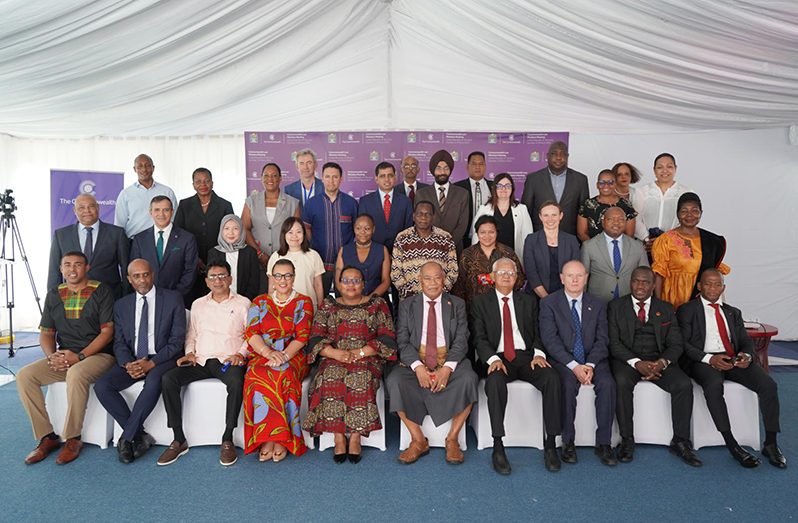–following agreement among law ministers
COMMONWEALTH law ministers have committed to addressing the legal needs of their citizens by removing barriers that hinder access to justice.
With some 2.5 billion Commonwealth citizens standing to benefit, law ministers concluded their meeting in Zanzibar, Tanzania, on Friday with a series of new measures and pledges.
The four-day deliberations, which included input from various stakeholders such as people with disabilities, civil society representatives, and legal innovators, resulted in a series of new measures and pledges.
Guyana’s Attorney General and Minister of Legal Affairs, Mohabir Anil Nandlall, participated in the meeting.
Key provisions include improved access to justice for people with disabilities, a model law on virtual assets, a new action plan to combat online violence against women, and a proposal to eliminate gender-discriminatory legislation.
Additionally, ministers welcomed new Commonwealth legal resources, including a mediation guide, a small claims court app for dispute resolution, and a criminal co-operation database.
The adoption of Commonwealth guidelines on the treatment of electronic evidence in criminal proceedings was also highlighted.
To facilitate implementation, ministers called on the Commonwealth Law Ministers Action Group to report progress at the next meeting, summarising the outcome statement issued by ministers representing one-third of humanity which concluded last month.
Commonwealth Secretary-General, The Rt Hon Patricia Scotland KC, stressed the critical nature of these measures, noting that two-thirds of the world’s population currently lack meaningful access to justice.
She highlighted the central role of closing the justice gap in realising the values and aspirations of the Commonwealth Charter, pinning technology as a vital tool in this endeavour.
“Our discussions have been purposeful, our decisions have been meaningful, and our powerful new consensus allows us to take the next giant steps forward towards equal access to justice, in modernised legal systems, across our wonderful Commonwealth.
“We leave Zanzibar with a powerful mandate which will allow us to take the next decisive steps to ensure justice for all is the lived experience of every one of the 2.5 billion people living in our Commonwealth,” she said.
The Secretary General urged member countries to harness, understand and master the benefits of technology and innovation in breaking down barriers of cost and complexity, and delivering legal systems which can meet the justice needs of all.
In their statement, ministers recognised the Commonwealth Secretariat’s tech-driven justice solutions and work on artificial intelligence as crucial interventions in improving access to legal information.
Hosted by the United Republic of Tanzania from March 4 to March 8, 2024, the meeting, chaired by Ambassador Dr Pindi H. Chana, the country’s Minister of Constitutional and Legal Affairs, received commendation for its substantive outcomes.
President of Zanzibar, Hussein Mwinyi, acknowledged the achievements and encouraged efforts toward digitisation for improved access to justice.
In their statement of outcomes for the meeting, law ministers participated in a working session on mapping a people-centred justice approach to access to justice, emphasising evidence-based, data-driven solutions.
Ministers received a paper on online violence against women and girls, leading to the recommendation for the development of a Commonwealth Action Plan to Address Cyber Violence Against Women and Girls.
The plan recognises the urgent need for members to prioritise efforts in addressing this serious problem impacting women, girls, and other vulnerable groups across the Commonwealth.
“Law ministers were guided through a discussion which highlighted the approach through a practical example of a member country’s development of a 10-year strategy on people-centred access to justice.
“Law ministers were encouraged to explore people centred innovative pathways to close the justice gap, which in some jurisdictions can extend to 55 per cent of the population. People centred solutions should be contextual, data driven and demonstrate potential for expansion or replication,” the statement of outcome detailed.
The statement presented a summary of findings and recommendations contained in five regional reports addressing the role of bystanders in the context of online violence.
Law ministers recognised that online violence has escalated and noted the urgent need for members to take steps to prioritise efforts to address this serious problem impacting women and girls and other vulnerable groups across the Commonwealth, including taking legislative steps to address online violence against women and girls.
The outcomes from the meeting are set to shape the agenda for the upcoming Commonwealth Heads of Government Meeting (CHOGM) in Samoa later this year, with the next meeting scheduled to be hosted by the Government of Fiji in February 2026.



.jpg)








